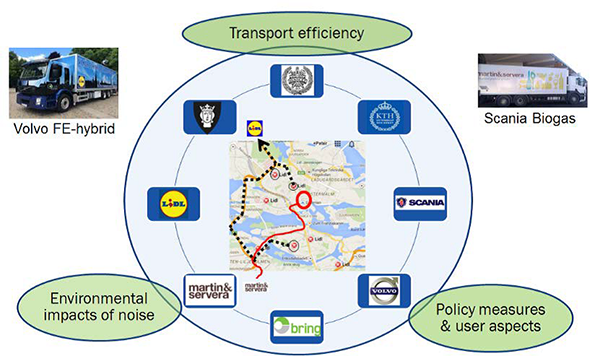United States-European Commission Urban Freight Twinning Initiative: Compendium of Project Summaries
| ||||
| Pilot | Policy | Europe |
Stockholm's need for better organization of urban freight transport and reduction of traffic congestion was what prompted the city to initiate an off-peak delivery pilot project in 2014. The goal was to make deliveries more flexible; to urge transport companies to invest in new, silent, environmentally friendly trucks; and to use the infrastructure in a more efficient way for all modes of transport. The objective is to improve the safety and livability of the city for its inhabitants.
From 2015 to 2016, the project tested nighttime distribution in the city center of Stockholm using one hybrid and one biogas vehicle for delivering goods to three retail establishments, and to a variety of hotels and restaurants. The outcomes were analyzed for four different aspects: transport efficiency, environmental impacts of noise, policy measures, and stakeholders' perceptions.

Off-peak deliveries project summary.
Source: Anastasios Koutoulas.
Pilot Project/Research/Policy
January 2015 - December 2016
Stockholm, Sweden
https://www.itrl.kth.se/research/projects/off-peak/off-peak-citydistribution-1.632601
Anastasios Koutoulas
Ph.D. Candidate
Royal Institute of Technology (KTH), School of Architecture and the Built Environment (ABE), Department of Transport Science
+46 8 790 6833
Anastasios.Koutoulas@abe.kth.se
Transport Efficiency:
Environmental impacts of noise:
The municipality of Stockholm found companies, organizations, and entities interested in off-peak deliveries, and organized their actions in a way that it would not generate new problems or inefficiencies for citizens. Major producers of heavy trucks provided two state-of-the-art, environmentally friendly distribution trucks. A company expert in silent systems for distribution (e.g., rolling cages) provided the necessary equipment. From the carriers' side, two of the biggest logistics companies in Sweden participated by delivering goods during nighttime hours to their customers.
|
United States Department of Transportation - Federal Highway Administration |
||